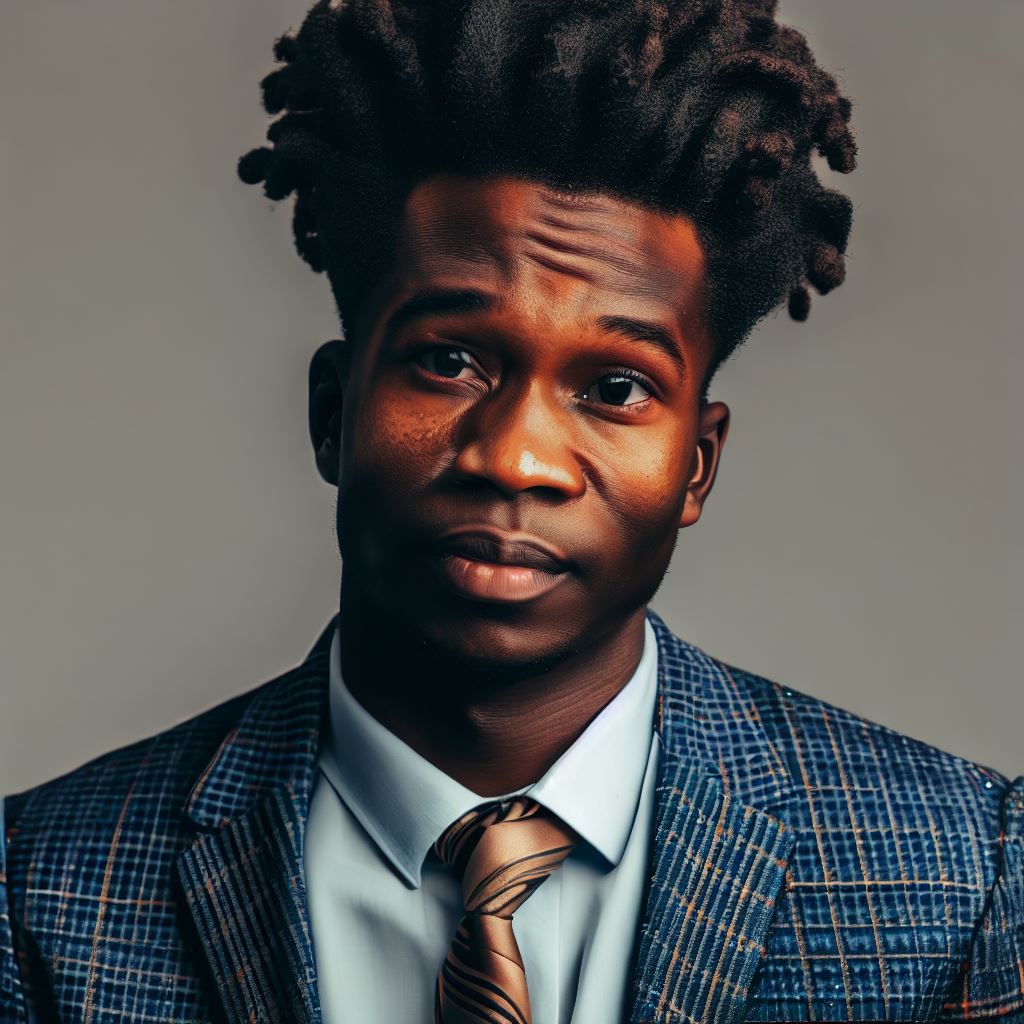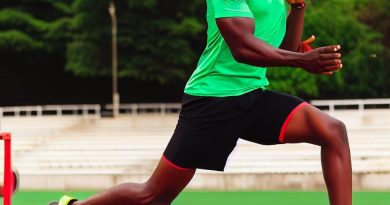Challenges & Opportunities: Sports Media in Nigeria Today
Last Updated on September 15, 2023
Introduction
A. Sports Media in Nigeria Today
Sports media in Nigeria is experiencing a dynamic transformation, marked by challenges and exciting opportunities.
B. Purpose of the Blog Post
This blog post aims to shed light on the evolving landscape of sports media in Nigeria.
We will explore the hurdles it faces and the promising avenues it offers for aspiring sports enthusiasts and media professionals.
Overview of Sports Media in Nigeria
Sports media plays a vital role in Nigeria, providing a platform for the dissemination of sports-related information and engaging sports enthusiasts across the country.
The industry has experienced significant growth in recent years, keeping pace with the increasing popularity of sports in Nigeria.
A. The Current State of Sports Media Platforms in Nigeria
Sports media platforms in Nigeria have evolved over the years, embracing digital technologies and social media platforms to reach a wider audience.
Traditional media outlets such as television and radio stations still play a significant role in covering sports events and analyzing sports-related news.
However, the rise of digital platforms has introduced a new era of sports media in Nigeria.
Online news websites, dedicated sports blogs, and social media pages have become increasingly popular among sports fans, providing instant updates, match analysis, and exclusive interviews.
B. Growth and Popularity of Sports Media in Recent Years
The growth and popularity of sports media in Nigeria have been remarkable in recent years.
The country’s passion for sports, particularly football, has fueled the demand for more sports-related content across various media platforms.
Sports television networks such as SuperSport and Channels TV have experienced tremendous growth, broadcasting live matches, sports analysis shows, and documentaries.
Additionally, sports radio stations like Brila FM have gained immense popularity with their engaging sports talk shows and live match commentaries.
The emergence of social media platforms, especially Twitter and Instagram, has revolutionized sports media consumption in Nigeria.
Sports fans can now follow their favorite athletes, sports journalists, and news accounts to get real-time updates, interact with fellow fans, and express their opinions.
C. Major Sports Events Covered by Nigerian Media
Nigerian media extensively covers major sports events, both international and domestic, catering to the diverse interests of sports enthusiasts.
Football, being the most popular sport in Nigeria, receives the largest coverage.
The Nigerian media closely follows European football leagues such as the English Premier League, Spanish La Liga, and the UEFA Champions League.
Nigeria’s national team, the Super Eagles, also garners immense coverage during international tournaments like the FIFA World Cup, Africa Cup of Nations, and Olympic Games.
Apart from football, Nigerian media also covers other sports like basketball, athletics, boxing, and tennis.
The coverage extends to local sports events and competitions, fostering the growth and development of various sporting disciplines in the country.
Sports media in Nigeria has evolved significantly, adapting to digital platforms and embracing new technologies.
The industry has experienced remarkable growth, catering to the nation’s passion for sports.
With a diverse range of sports media platforms available, Nigerians can access instant updates, engaging analysis, and exclusive interviews on various sports events.
Whether it is football, basketball, athletics, or other sports, Nigerian media ensures comprehensive coverage to fulfill the needs of sports enthusiasts across the country.
Read: Sports Ethics and Education: A Nigerian Perspective
Challenges Faced by Sports Media in Nigeria
A. Lack of Funding and Infrastructure for Sports Media Organizations
- Sports media in Nigeria grapples with inadequate financial support.
- Many organizations struggle to invest in modern equipment and technology.
- Infrastructure like studios and broadcast facilities often fall short of international standards.
- Limited funding hampers the ability to cover a wide range of sports comprehensively.
- Attracting sponsors and advertisers remains a significant challenge.
B. Limited Access to Reliable Information and Data
- Sports journalists often face difficulties in accessing timely and accurate information.
- Lack of official statistics and data hinders in-depth analysis.
- Inconsistent communication from sports bodies leads to misinformation.
- Reliable sources for background research on athletes and events are scarce.
- This limitation affects the quality and depth of sports reporting.
C. Competition from International Sports Media Platforms
- Nigerian sports media contends with global giants like ESPN and BBC Sport.
- International platforms have a wider reach and often set the news agenda.
- Local media struggles to compete with the production quality and resources of global networks.
- This competition can marginalize local stories and perspectives.
- Maintaining a unique Nigerian sports identity becomes challenging.
D. Ethical Issues and Biased Reporting in Sports Journalism
- Sports journalism in Nigeria faces ethical dilemmas, including bribery and sensationalism.
- Some journalists succumb to biases based on personal affiliations or interests.
- Unverified rumors and gossip sometimes masquerade as news.
- Upholding journalistic integrity is a constant battle.
- Biased reporting can harm the credibility of sports media.
Despite these challenges, Nigerian sports media also holds significant opportunities for growth and improvement.
Addressing these issues collectively as an industry is crucial for its development and sustainability.
In the next section, we will explore the potential opportunities that can reshape the landscape of sports media in Nigeria.
Read: How to Find a PE Teaching Job in Nigeria: A Guide
Opportunities for Sports Media in Nigeria
A. Growing sports fanbase and interest in Nigeria
- Nigeria boasts a passionate sports fanbase, especially for football, making it a ripe market for sports media.
- The increasing interest in other sports like basketball and athletics provides diverse content opportunities.
- Local sports leagues like the Nigerian Professional Football League (NPFL) are gaining popularity, creating a demand for coverage.
- The international success of Nigerian athletes, such as in the Olympics, fuels national pride and interest.
B. Emerging digital media platforms and social media engagement
- Nigeria’s expanding digital landscape offers sports media new avenues for content distribution.
- Social media platforms like Twitter, Instagram, and YouTube provide direct engagement with fans.
- Live streaming of sports events on digital platforms enhances accessibility and audience reach.
- Interactive content like polls, quizzes, and live chats boosts fan engagement and loyalty.
C. Increased investment in sports infrastructure and events
- Nigeria’s investment in sports infrastructure, like stadiums and training facilities, supports event coverage and analysis.
- Hosting major sporting events, such as the FIFA U-20 Women’s World Cup, generates media buzz and sponsorship opportunities.
- The rise of sports academies and grassroots development programs creates stories and profiles for sports media.
- Investment in sports tourism and the growth of sports-related businesses provide content possibilities.
D. Collaboration with international sports media organizations
- Partnering with global sports media giants opens doors to international audiences.
- Joint ventures can bring advanced technology and production quality to Nigerian sports coverage.
- Exchange programs with international journalists foster cross-cultural perspectives and expertise.
- Collaborations enhance access to exclusive interviews and behind-the-scenes content.
In today’s Nigerian sports media landscape, opportunities abound. The growing fanbase’s hunger for sports content, coupled with the digital revolution and social media engagement, allows for diverse storytelling.
Investments in sports infrastructure and international collaborations further elevate the potential for Nigerian sports media to shine on the global stage.
As the nation’s sports scene continues to thrive, so too does the promise for sports media to capture and share its exciting journey.
Read: Salary Insights: Assistant Coaches in Nigeria 2023

The Role of Sports Media in Promoting Nigerian Sports
A. How sports media can play a pivotal role in promoting Nigerian athletes and sports
Sports media can play a pivotal role in promoting Nigerian athletes and sports.
- Creating awareness: Sports media has the power to bring attention to Nigerian sports, both locally and internationally.
Through various platforms such as television, radio, and social media, they can broadcast live matches and tournaments, generating interest and creating awareness among the public. - Building athlete profiles: Sports media can shine a spotlight on Nigerian athletes, providing them with much-needed recognition.
By featuring their stories, achievements, and struggles, media coverage helps to build their profiles and increase their popularity, both within Nigeria and globally. - Inspiring young athletes: Sports media coverage of successful Nigerian athletes can serve as an inspiration for young aspiring athletes.
Through their stories, young talents can see that with hard work, dedication, and the right opportunities, they too can achieve great heights in their chosen sport. - Attracting sponsorships and funding: Media coverage plays a significant role in attracting sponsorships and funding for Nigerian sports.
Media exposure boosts athlete recognition, making them attractive to sponsors and investors for financial backing, training, and infrastructure. - Driving sports culture: Sports media helps in cultivating a sports culture in Nigeria. Extensive sports event coverage ignites spectator excitement, driving active participation in sports and support for local teams and athletes.
- Boosting tourism: Media coverage of Nigerian sports can boost tourism in the country. Major sporting events attract visitors from all over the world, thereby promoting tourism and generating revenue for the economy.
Sports media plays a crucial role in showcasing the country’s rich sporting heritage and attracting international visitors.
B. Success stories of Nigerian athletes who gained recognition through sports media coverage
- Blessing Okagbare: As one of Nigeria’s most successful athletes, Okagbare gained recognition through extensive media coverage.
Her achievements in track and field events were broadcasted nationally and internationally, elevating her status as a top-tier athlete. - Anthony Joshua: Joshua, a Nigerian-born British professional boxer, gained popularity through media coverage of his matches.
His remarkable boxing skills and remarkable journey to becoming a world heavyweight champion captured the attention of both Nigerian and international sports media. - Kanu Nwankwo: Nwankwo’s football career, especially his time with Arsenal FC, received substantial media coverage.
This coverage helped make him one of Nigeria’s most celebrated footballers and a role model for aspiring athletes. - Aruna Quadri: Through media coverage of his table tennis achievements, Aruna Quadri gained recognition both in Nigeria and globally.
His successes in international competitions were highlighted by sports media, putting him on the map as a top table tennis player.
C. The potential impact of media coverage in improving sports infrastructure and funding
- Increased investments: Extensive media coverage can attract potential investors and sponsors to invest in sports infrastructure development and funding.
Recognizing the popularity and potential of Nigerian athletes, sponsors and investors may contribute to building state-of-the-art training facilities and stadiums. - Government attention: When media coverage highlights the achievements of Nigerian athletes and the potential of sports in the country, it can draw the attention of the government.
This attention can lead to increased government funding for sports infrastructure development and support for athletes. - Public pressure: Media coverage can create public awareness and put pressure on relevant authorities to support sports development.
The exposure of inadequate infrastructure and lack of funding can push the government and private organizations to take action and improve the conditions for Nigerian athletes. - Improved training programs: Media coverage can help identify gaps in training programs and highlight the need for improvement.
Media coverage reveals athlete and coach challenges, driving development and improvement of training programs for better athlete support. - Enhanced international representation: Media coverage of Nigerian sports can create a positive image internationally, attracting attention from global sports organizations.
This attention can lead to opportunities for Nigerian athletes to participate in international competitions, further promoting sports development in the country.
Sports media plays a crucial role in promoting Nigerian sports.
Through creating awareness, building athlete profiles, and attracting sponsorships, media coverage has the potential to boost the sports industry in Nigeria.
Additionally, success stories of Nigerian athletes and media coverage of their achievements inspire young talents while improving sports infrastructure and funding.
With continuous media support, Nigerian sports can flourish, producing more exceptional athletes and garnering international recognition.
Read: Sports Radio in Nigeria: A Growing Field for Journalists
The Future of Sports Media in Nigeria
- Nigeria’s sports media industry is poised for significant growth in the coming years.
- The increasing popularity of sports and the rise of digital media platforms provide ample opportunities.
- The future of sports media in Nigeria will be driven by advancements in technology.
- Live streaming and on-demand content will become more prevalent.
- Virtual reality and augmented reality will revolutionize the sports viewing experience.
- Sports media in Nigeria will also witness the integration of social media platforms.
- Fans will have greater interactivity, allowing for real-time engagement and user-generated content.
- Data analytics and artificial intelligence will play a pivotal role in sports media.
- Predictive analytics will enhance viewer experience and provide personalized recommendations.
- Challenges may arise in the future, such as the accessibility and affordability of high-speed internet.
- Infrastructure development is necessary to provide seamless streaming experiences for sports fans.
- Intellectual property rights and piracy issues may also pose challenges to sports media in Nigeria.
- Media organizations need to adopt innovative strategies to protect their content and revenue.
- Collaboration between media organizations, regulators, and technology providers is crucial.
The future of sports media in Nigeria is bright, but challenges must be overcome through collaboration, innovation, and supportive policies.
Nigeria can become an African sports media hub by utilizing technology, optimizing revenue, and nurturing a supportive ecosystem.
Conclusion
The challenges and opportunities in sports media in Nigeria today have been analyzed.
The main points discussed include the lack of funding, inadequate infrastructure, and the rise of digital platforms.
Despite these challenges, sports media plays a significant role in Nigerian society. It serves as a platform for highlighting talent, promoting unity, and educating the public.
Therefore, investing in this sector is crucial for both the development of sports and the growth of the nation.
As Nigeria continues to excel in various sports, it is imperative to foster a robust sports media industry that can effectively showcase and preserve these achievements.
Let us support and encourage the growth of sports media in Nigeria for a brighter future.


